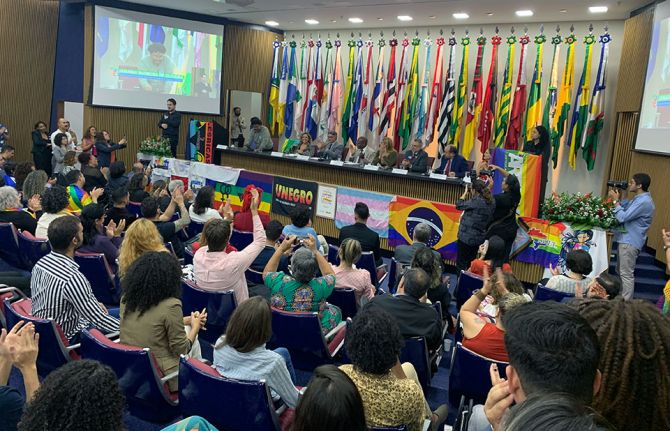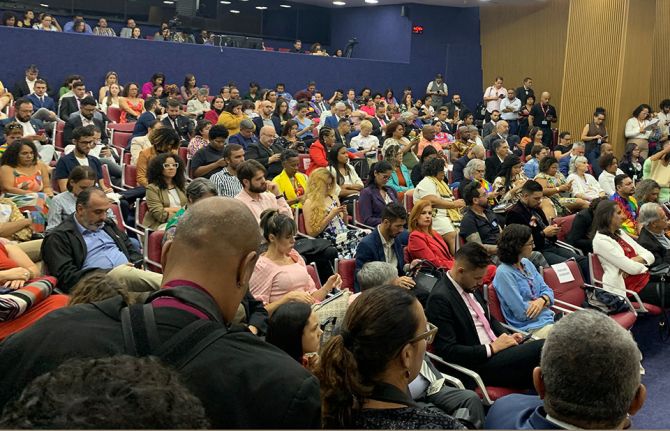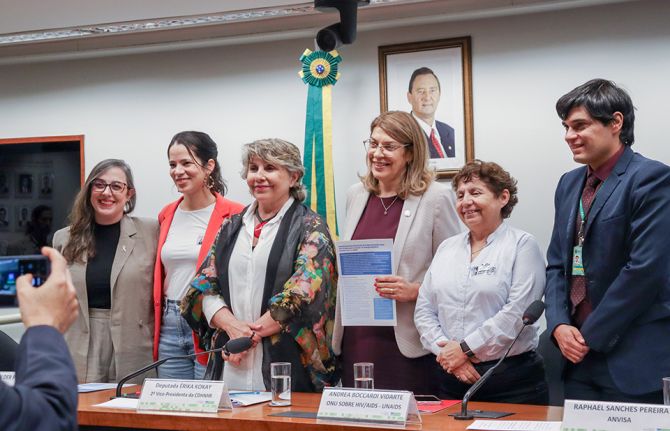



Feature Story
Brazil announces its commitment to the global initiative against HIV-related stigma and discrimination
19 May 2023
19 May 2023 19 May 2023Brazil has joined the 34 countries that are part of the Global Partnership to take action to eliminate all forms of HIV-related stigma and discrimination. The country's entry into this group of nations was announced at a celebratory event of the International Day Against Homophobia, Biphobia, and Transphobia, held in Brasilia, Brazil’s capital and organized in partnership by UNAIDS, ILO, and the Ministry of Human Rights and Citizenship.
The Global Partnership is an initiative launched through a call for action from the NGO Delegation to the UNAIDS Programme Coordinating Board (PCB) in 2018 to remove HIV related stigma in six settings: healthcare, justice, community, workplace, educationa and humanitarian. It is co-convened by UNAIDS, UN Women, the United Nations Development Programme (UNDP), the Global Network of People Living with HIV, and the Global Fund to Fight AIDS, Tuberculosis, and Malaria. It is also supported by a technical working group composed of 10 United Nations agencies and 24 partners and civil society organizations.
With Brazil, now 35 countries have formally joined the Global Partnership, committing to act against HIV-related stigma and discrimination in the contexts of healthcare services, educational settings, workplaces, justice systems, domestic and community environments, emergency systems, and humanitarian crises.
According to Luisa Cabal, the Regional Director of UNAIDS in Latin America, Brazil's entry into the Global Partnership is a significant step in the collective response against HIV-related stigma and discrimination in Latin America and the world. "By joining this initiative, Brazil reaffirms its commitment to defending human rights, promoting social inclusion, and eliminating barriers to access prevention, diagnosis, treatment, and ongoing response to HIV," she explains.
By joining the Global Partnership, Brazil will have access to a platform that will allow the country to share experiences and best practices with the other participating countries, creating opportunities for collective learning, strengthening the joint response to HIV-related stigma and discrimination.
"It is important to highlight that by joining the Global Partnership, Brazil will also reinforce its leadership role in the region and global diplomacy for health and human rights, demonstrating its commitment to equity and social justice," emphasizes Luisa Cabal.
It is indeed a precedent for the GP that commitment to join the Global Partnership has been witnessed by two Ministers.
Minister of Human Rights and Citizenship Silvio Almeida reiterated his unrestricted support and commitment to public policies promoting and protecting the rights of LGBTQIA+ people. ”For those who suffer violence, and are killed simply for being who they are, these people will be protected in a public commitment, and I renew this commitment not only as Silvio Almeida, but as Minister of State for Human Rights of Brazil” emphasized H.E.
Representing the Ministry of Health Helvécio Miranda, Secretary of Specialized Health Care, similarly shared the Ministry's commitment to embrace the agenda of LGBTQIA+ rights and ensure comprehensive healthcare access for all people emphasizing on a gender approach, and with a special focus on those at risk, with specific needs, or experiencing different forms of violence.
Vinícius Pinheiro, Director for Brazil at ILO, embraced the significance of the Global Partnership in promoting social justice and decent work with inclusion and opportunities for all people so that no one is left behind.



